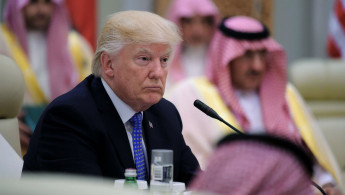Was the $110 billion US-Saudi arms deal 'fake news'?
A $110 billion US-Saudi military deal that was allegedly signed between the two allies during President Donald Trump’s first official foreign visit to the kingdom last month, does not exist, a former CIA agent and senior Middle East US presidential advisor, claimed.
The multi-billion dollar military deal, which was seen to mark a new chapter in regional security for the two allies, is comprised of "a bunch of letters of interest or intent, but not contracts," according to Bruce Riedel, a senior fellow in the Center for Middle East Policy.
"I’ve spoken to contacts in the defense business and on the Hill, and all of them say the same thing: There is no $110 billion deal," he wrote in an article published by the Washington-based Brookings Institution on Monday.
The arms sales wing of the Pentagon - the Defense Security Cooperation Agency - calls them “intended sales,” he continues, noting that none of the supposed sales have been submitted to the Senate for review, as per protocol.
In a high-profile ceremony watched on by leading officials between the two groups, Trump and King Salman had marked a new chapter in relations on regional security issues and military cooperation during the US president's visit last month.
The deal was branded the "biggest single arms deals" in US' history, and The New Arab's Saudi correspondent confirmed it would include military contracts worth $350 billion over the next decade.
However, Riedel said none of the deals identified during Trump’s visit were new, but were in fact proposed to the Saudi's during the previous Obama administration.
"An example is a proposal for sale of four frigates (called multi-mission surface combatant vessels) to the Royal Saudi navy," Riedel notes.
"This proposal was first reported by the State Department in 2015. No contract has followed. The type of frigate is a derivative of a vessel that the US Navy uses but the derivative doesn’t actually exist yet."
In fact, the alleged signing of the latest deal was "fake news", Riedel suggests.
"What the Saudis and the administration did is put together a notional package of the Saudi wish list of possible deals and portray that as a deal. Even then the numbers don’t add up."
"It’s unlikely that the Saudis could pay for a $110 billion deal any longer, due to low oil prices and the two-plus years old war in Yemen."





 Follow the Middle East's top stories in English at The New Arab on Google News
Follow the Middle East's top stories in English at The New Arab on Google News
![Both Hamas and the Palestinian Authority welcomed the ICC arrest warrants [Getty]](/sites/default/files/styles/image_330x185/public/2024-11/GettyImages-2178351173.jpg?h=199d8c1f&itok=TV858iVg)

